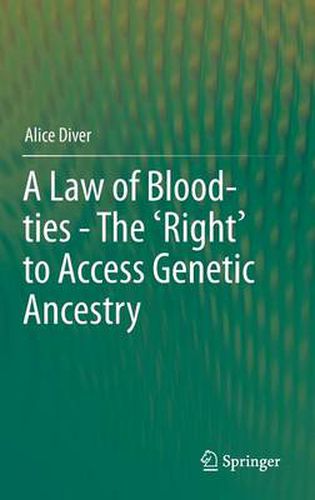Readings Newsletter
Become a Readings Member to make your shopping experience even easier.
Sign in or sign up for free!
You’re not far away from qualifying for FREE standard shipping within Australia
You’ve qualified for FREE standard shipping within Australia
The cart is loading…






This title is printed to order. This book may have been self-published. If so, we cannot guarantee the quality of the content. In the main most books will have gone through the editing process however some may not. We therefore suggest that you be aware of this before ordering this book. If in doubt check either the author or publisher’s details as we are unable to accept any returns unless they are faulty. Please contact us if you have any questions.
This text collates and examines the jurisprudence that currently exists in respect of blood-tied genetic connection, arguing that the right to identity often rests upon the ability to identify biological ancestors, which in turn requires an absence of adult-centric veto norms. It looks firstly to the nature and purpose of the blood-tie as a unique item of birthright heritage, whose socio-cultural value perhaps lies mainly in preventing, or perhaps engendering, a feared or revered sense of ‘otherness.’ It then traces the evolution of the various policies on ‘telling’ and accessing truth, tying these to the diverse body of psychological theories on the need for unbroken attachments and the harms of being origin deprived.
The ‘law’ of the blood-tie comprises of several overlapping and sometimes conflicting strands: the international law provisions and UNCRC Country Reports on the child’s right to identity, recent Strasbourg case law, and domestic case law from a number of jurisdictions on issues such as legal parentage, vetoes on post-adoption contact, court-delegated decision-making, overturned placements and the best interests of the relinquished child. The text also suggests a means of preventing the discriminatory effects of denied ancestry, calling upon domestic jurists, legislators, policy-makers and parents to be mindful of the long-term effects of genetic ‘kinlessness’ upon origin deprived persons, especially where they have been tasked with protecting this vulnerable section of the population.
$9.00 standard shipping within Australia
FREE standard shipping within Australia for orders over $100.00
Express & International shipping calculated at checkout
This title is printed to order. This book may have been self-published. If so, we cannot guarantee the quality of the content. In the main most books will have gone through the editing process however some may not. We therefore suggest that you be aware of this before ordering this book. If in doubt check either the author or publisher’s details as we are unable to accept any returns unless they are faulty. Please contact us if you have any questions.
This text collates and examines the jurisprudence that currently exists in respect of blood-tied genetic connection, arguing that the right to identity often rests upon the ability to identify biological ancestors, which in turn requires an absence of adult-centric veto norms. It looks firstly to the nature and purpose of the blood-tie as a unique item of birthright heritage, whose socio-cultural value perhaps lies mainly in preventing, or perhaps engendering, a feared or revered sense of ‘otherness.’ It then traces the evolution of the various policies on ‘telling’ and accessing truth, tying these to the diverse body of psychological theories on the need for unbroken attachments and the harms of being origin deprived.
The ‘law’ of the blood-tie comprises of several overlapping and sometimes conflicting strands: the international law provisions and UNCRC Country Reports on the child’s right to identity, recent Strasbourg case law, and domestic case law from a number of jurisdictions on issues such as legal parentage, vetoes on post-adoption contact, court-delegated decision-making, overturned placements and the best interests of the relinquished child. The text also suggests a means of preventing the discriminatory effects of denied ancestry, calling upon domestic jurists, legislators, policy-makers and parents to be mindful of the long-term effects of genetic ‘kinlessness’ upon origin deprived persons, especially where they have been tasked with protecting this vulnerable section of the population.